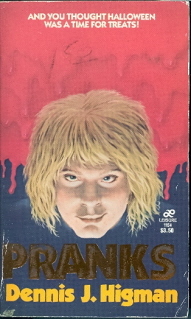 By DENNIS J. HIGMAN (Leisure; 1983)
By DENNIS J. HIGMAN (Leisure; 1983)
This justifiably forgotten Halloween themed relic is most interesting not for what it is but, rather, for what it isn’t. During the so-called horror boom many non-genre affiliated novels were misleadingly classified as horror, which is what happened with PRANKS, a would-be suspense thriller that appeared as a paperback original from Leisure in 1983 (and again in ‘91), which inexplicably labelled it as “occult.” Furthering the deception is the back cover description stating that “The spirits are out…” and that “The murders start, each one more terrifying, more heinous than the previous,” neither of which are accurate.
The book in actuality is a blandly written, predictably plotted slog that to add further annoyance is massively overlong (431 pages). It’s set in a peaceful Puget Sound, WA community on Halloween night, where the teenage psychopath Bucky Foster, dressed up as a fictional character named Captain Terror who Bucky takes a bit too seriously, is on the loose. This loon is looking to make trouble, and the time period seems ideal for just that. Before the night is over Bucky will have kicked a sheep to death, caused a man to drown and terrorized the local mean old lady.
That about covers the book’s first half, with the second taking place on the following day, with dual investigations into the previous night’s mayhem and Bucky’s checkered past. Both turn up explanations that will be evident to most readers in the opening chapters, which brings up yet another misleading back cover claim, that “the killer is someone his victims would never suspect.” In fact there’s never the slightest bit of doubt who the killer is, with the only real question being why the authorities take so long to go after him.
It all comes down to a hokey cliff-set climax, in which Bucky is confronted by the virtuous Fred, a retired railroad worker (whose daughter Jan happens to be Bucky’s teacher). I’ll refrain from revealing which one of them ends up falling to his death.
PRANKS is by no means the only example of a mislabeled “horror” novel, but it is certainly one of the most grievous. I only hope Leisure managed to sell some copies of this book, as I strongly doubt it will ever be reprinted—and that, frankly, is not a bad thing.
